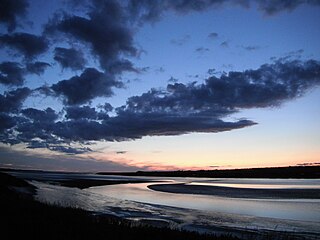
Dalhousie University is a large public research university in Nova Scotia, Canada, with three campuses in Halifax, a fourth in Bible Hill, and a second medical school campus in Saint John, New Brunswick. Dalhousie offers over 200 degree programs in 13 undergraduate, graduate, and professional faculties. The university is a member of the U15, a group of research-intensive universities in Canada.

Mount Saint Vincent University, often referred to as the Mount, is a public, primarily undergraduate, university located in Halifax, Nova Scotia, Canada, and was established in 1873. Mount Saint Vincent offers undergraduate programs in Arts, Science, Education, and Professional Studies. The Mount has 13 graduate degrees in areas including Applied Human Nutrition, School Psychology, Child and Youth Study, Education, Family Studies and Gerontology, Public Relations and Women's Studies. The Mount offers a doctorate program, a Ph.D. in Educational Studies, through a joint-initiative with St. Francis Xavier University and Acadia University. The Mount offers more than 190 courses, over 10 full undergraduate degree programs and four graduate degree, programs online.

Cape Breton University (CBU) is a public university located in Sydney, Nova Scotia, Canada. It is the only post-secondary degree-granting institution within the Cape Breton Regional Municipality and on Cape Breton Island. The university is enabled by the Cape Breton University Act passed by the Nova Scotia House of Assembly. Prior to this, CBU was enabled by the University College of Cape Breton Act (amended). The University College of Cape Breton's Coat of Arms were registered with the Canadian Heraldic Authority on May 27, 1995.

The Technical University of Nova Scotia (TUNS) was a Canadian university located in Halifax, Nova Scotia.

Truro is a town in central Nova Scotia, Canada. Truro is the shire town of Colchester County and is located on the south side of the Salmon River floodplain, close to the river's mouth at the eastern end of Cobequid Bay.

A normal school or normal college is an institution created to train teachers by educating them in the norms of pedagogy and curriculum. Many such schools have since been called teacher training colleges or teachers' colleges, but in Mexico, continue to be called normal schools, with student-teachers being known as normalistas. Many schools require a high school diploma for entry, and may be part of a comprehensive university. Normal schools in the United States, Canada, and Argentina trained teachers for primary schools, while in Europe, the equivalent colleges typically educated teachers for primary schools and later extended their curricula to also cover secondary schools.

NSCAD University, also known as the Nova Scotia College of Art and Design (NSCAD), is a public art university in Halifax, Nova Scotia, Canada. The university is a co-educational institution that offers bachelor's and master's degrees. The university also provides continuing education services through its School of Extended Studies.
Nova Scotia Community College or NSCC is a Canadian community college serving the province of Nova Scotia through a network of 14 campuses and three community learning centres.
The Faculty of Agriculture at Dalhousie University is a Canadian agricultural college and faculty of Dalhousie University located in Bible Hill, Nova Scotia. The Faculty of Agriculture offers the only university level programs in agriculture in Atlantic Canada. Founded 14 February 1905 as the Nova Scotia Agricultural College within the Nova Scotia Department of Agriculture, it merged with Dalhousie University on 1 September 2012. The campus is referred to as Dalhousie University's "Agricultural Campus" or by its popular sports nickname of "Dal AC" or simply the "AC."

Atlantic School of Theology (AST) is a Canadian public ecumenical university that provides graduate level theological education and undertakes research to assist students to prepare for Christian ministries and other forms of public leadership. It is located in Halifax, Nova Scotia, Canada, and its enrolment is approximately 160 degree and non-degree students. Persons of all religious traditions, or none, are welcome to study at AST.
The University of New Brunswick Faculty of Law is the second oldest university-based common law Faculty in the Commonwealth. It is located in New Brunswick's capital city, Fredericton, and is one of two law schools located in the province, the other being the French-language Faculty at l'Université de Moncton.
Saint Mary's University (SMU) is a public university located in Halifax, Nova Scotia, Canada. The school is best known for having nationally leading programs in business and chemistry. The campus is situated in Halifax's South End and covers approximately 32 hectares.

Halifax, Nova Scotia has the largest selection of education options in Atlantic Canada.

Lenore Zann is a Canadian actress and politician who has served as the Member of Parliament (MP) for the riding of Cumberland—Colchester in the House of Commons of Canada as a member of the Liberal Party. Before entering federal politics, she represented the electoral district of Truro-Bible Hill in the Nova Scotia House of Assembly from 2009 until 2019 as a member of the Nova Scotia New Democratic Party and from June 9, 2019, until September 12, 2019, as an independent.
Karen Lynn Casey is a Canadian politician, who represented the electoral district of Colchester North in the Nova Scotia House of Assembly, first as a Progressive Conservative, and then as member of the Liberal caucus from 2011 to 2021.

Higher education in Prince Edward Island refers to education provided by higher education institutions in the Canadian province of Prince Edward Island. In Canada, education is the responsibility of the provinces and there is no Canadian federal ministry governing education. Prince Edward Island has two post-secondary institutions authorized to grant degrees: one university, the University of Prince Edward Island, and one college, Maritime Christian College. There are also two community colleges: Holland College, which operates centres across the province, and Collège de l'Île, which offers post secondary education in French. The governing body for higher education in Prince Edward Island is the Department of Innovation and Advanced Learning, headed by the Minister of Innovation and Advanced Learning, the Honourable Allen Roach.

Higher education in Nova Scotia refers to education provided by higher education institutions. In Canada, education is the responsibility of the provinces and there is no Canadian federal ministry governing education. Nova Scotia has a population of less than one million people, but is home to ten public universities and the Nova Scotia Community College, which offers programs at 13 locations.
Nova Scotia Agricultural College (NSAC) was a publicly owned Canadian university college located at Bible Hill, Nova Scotia. The Nova Scotia Agricultural College merged with Dalhousie University and became Dalhousie's Faculty of Agriculture on 1 September 2012. The popular nickname remains the "AC".
J. Chalmers Doane is a Canadian educator and musician who spearheaded the use of the ukulele for music instruction in the Canadian school systems.

The Halifax School for the Deaf was an institution in Halifax, Nova Scotia, Canada, which opened on 4 August 1856. It was the first school of the deaf in Atlantic Canada. There was later a dispute over who the true founder was, William Gray (1806-1881), a deaf Scottish immigrant who was the first teacher in the back room of a house in Argyle Street, or George Tait (1828-1904), another deaf Scot, who claimed to have been the driving force behind the establishment of the school. Gray was sacked in 1870 for being intoxicated and for threatening pupils with violence.














